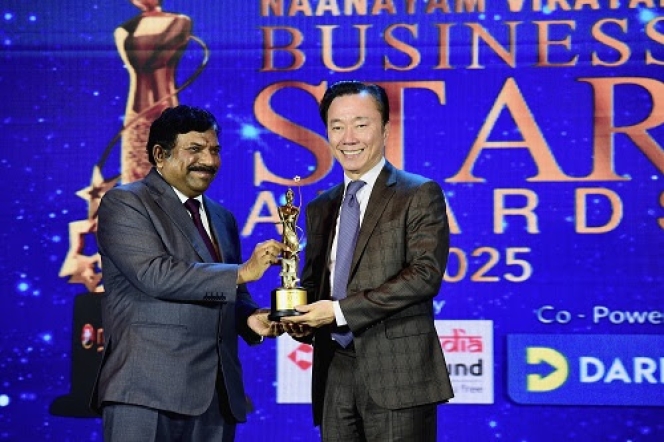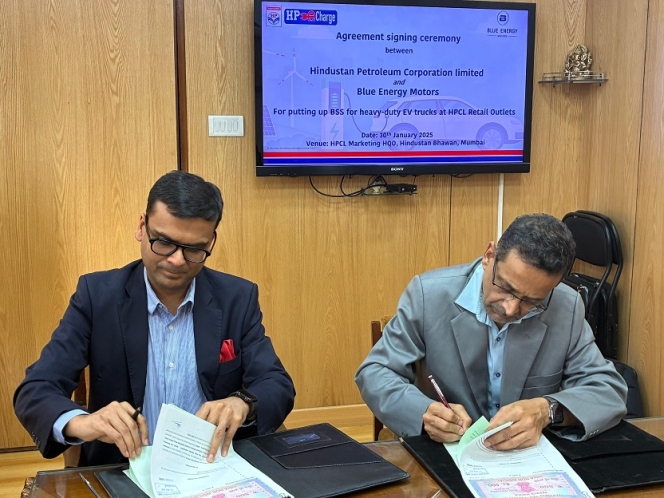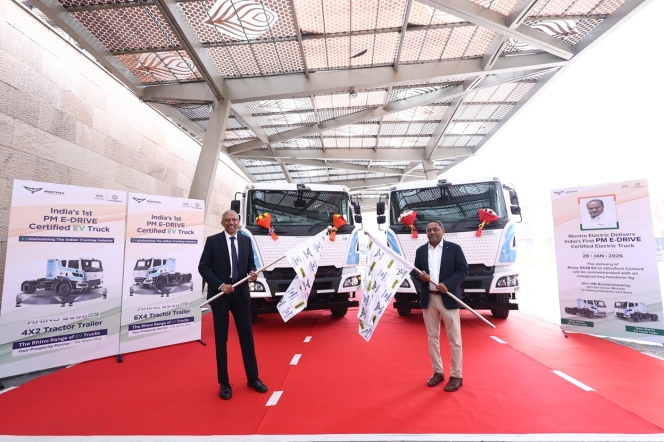Electric Vehicles: Driving India's Last Mile Connectivity for Economic Growth
- By Dr. Darshan Rana, Chairman & MD, Rana Group
- August 08, 2023

“Rural India is the real India,” this statement holds a profound truth. While urban centres may dominate the narrative of progress and development, it is in rural India where the heart and soul of the nation reside. But for any country to progress, connectivity with rural regions, especially the last mile connectivity is an absolute must. And electric vehicles are driving India’s last mile connectivity and contributing to the nation’s economic growth.
There is no debate that EVs offer a viable alternative, bringing numerous benefits such as reduced emissions, lower operational costs, and improved energy efficiency. Through this article I would like to highlight six critical factors which will contribute to EVs becoming the driving force in India’s last mile connectivity.
Cost of Ownership- a strong ruling factor:
One significant advantage of EVs is their lower cost of ownership compared to traditional internal combustion engine (ICE) vehicles. While the initial purchase price of EVs may be higher, the operational and maintenance costs are considerably lower. EVs have fewer moving parts and require less frequent servicing, resulting in reduced maintenance expenses. Moreover, the cost of charging an EV is substantially lower than the price of fossil fuels, contributing to long-term savings. As EV technology continues to advance, economies of scale and improved battery technology are expected to further drive down the cost of ownership, making EVs an attractive choice for last mile connectivity in India.
The world of E-commerce- Driving EV adoption in full scale:
It is estimated that the B2C e-commerce market in India is expected to reach $ 107.3 billion in 2023. The exponential growth of e-commerce in India has heightened the demand for efficient last mile connectivity solutions. With the surge in online shopping, delivery vehicles have become a ubiquitous presence in urban areas. Recognizing the need for sustainable transportation options, e-commerce companies are increasingly adopting EVs for their logistics operations. This trend not only promotes eco-friendly practices but also contributes to the wider adoption of EVs by raising awareness and creating a market for electric commercial vehicles. The symbiotic relationship between e-commerce and EVs presents a significant opportunity to accelerate the transition to clean and efficient mobility in India.
Government Policies – Creating impactful solutions:
The Indian government has been instrumental in driving the adoption of EVs through various policy measures. Since 2011 when the GOI formed the National Council for Electric Mobility who was tasked to make recommendations to promote e-mobility & manufacturing of EVs, initiatives such as FAMEscheme provide financial incentives and subsidies to both manufacturers and consumers, making EVs more affordable. The government has also implemented ambitious targets for EV adoption and aims to electrify a significant portion of the public transportation system. Additionally, favourable policies, such as exemption from certain taxes and tolls, encourage individuals and organizations to embrace EVs.
OEM Impact on EV ecosystem- a critical role:
Original Equipment Manufacturers (OEMs) play a pivotal role in shaping the EV ecosystem in India. Several automotive companies have entered the EV market, offering a diverse range of electric vehicles to cater to different segments and requirements. OEMs are investing in research and development to improve battery technology, enhance vehicle performance, and extend the driving range. Furthermore, collaborations with battery manufacturers and charging infrastructure providers are essential to ensure seamless integration and sustainable growth of the EV ecosystem. The competitive landscape is driving innovation, affordability, and improved consumer choices, further bolstering India's last mile connectivity through EVs.
Public & Private sector collaborations- a symbiotic relationship:
The metro rail connectivity is considered to be one of the finest examples of a healthy PPP project in India. In the same lines, the successful transition to electric mobility requires collaborations between the public and private sectors. Public entities, such as municipal corporations and transportation authorities, can facilitate the deployment of EV charging infrastructure and provide incentives for fleet electrification. Partnerships between EV manufacturers, utility companies, and charging infrastructure providers are vital to establishing a robust charging network across the country. Furthermore, knowledge-sharing platforms, industry associations, and research institutions can foster collaboration and exchange best practices to overcome challenges and expedite EV adoption.
Tracking and Analysis of EV Adoption – the role of data:
To ensure the successful implementation of EVs in India's last mile connectivity, tracking and analysis of EV adoption are crucial. Data-driven insights on charging patterns, driving habits, and infrastructure requirements enable stakeholders to make informed decisions and identify barriers and opportunities, refine policies, and allocate resources effectively. Real-time monitoring of charging stations and vehicle performance ensures reliable operation and user satisfaction. Additionally, comprehensive analysis can facilitate targeted interventions, such as incentives for specific regions or sectors, and inform future infrastructure planning. Continuous tracking and analysis contribute to an efficient and optimized EV ecosystem.
A region's mobility is influenced by three key factors: people, infrastructure, and sustainability. These elements determine how well transportation functions within the city. Understanding the needs and behaviors of residents is crucial in designing effective transportation systems, because this in turn will impact the economic development of the region. Infrastructure, including roads, public transit, and pedestrian walkways, plays a vital role in facilitating smooth movement. Importantly, prioritizing sustainable options like electric vehicles and promoting active transportation helps create a greener and more efficient urban environment, with focus on last mile connectivity.
- VinFast
- Investor of the Year
- Urban Electric Vehicle of the Year
- VinFast VF 7
- Motor Vikatan Awards 2026
VinFast Wins Dual Honours In India For Investment And Electric SUV
- By MT Bureau
- January 31, 2026

VinFast’s strategic progress in India has been further validated through recent accolades from the influential Vikatan Group media network. The company was distinguished with two significant awards: one recognising its substantial investment commitment, and the other honouring its VF 7 model as the premier urban electric vehicle for 2026. These commendations underscore the brand’s deepening integration into the Indian automotive sector, highlighting both its industrial strategy and its product relevance.
The title of Investor of the Year, conferred by Nanayam Vikatan business magazine, specifically acknowledges VinFast’s landmark commitment to establishing an electric vehicle manufacturing facility in Thoothukudi, Tamil Nadu. This project is noted not only for its scale and strategic clarity but also for its anticipated role in fostering a new industrial corridor, generating employment and bolstering the local supplier network. It aligns with national initiatives like Make in India and reflects confidence in the region’s manufacturing potential.
Concurrently, the VF 7 electric SUV was named Urban Electric Vehicle of the Year at the Motor Vikatan Awards 2026. This recognition from automotive experts underscores the model’s successful adaptation to India’s urban driving conditions, balancing design, performance, safety and comfort. It serves as a testament to VinFast’s product development focus and its localisation strategy aimed at meeting specific market demands.
As a respected media institution in South India with a legacy dating to 1926, the Vikatan Group’s awards carry considerable weight among businesses and consumers. These latest honours add to a growing list of VinFast’s achievements in the market, illustrating the convergence of its investment, manufacturing, and product efforts. Within a short timeframe, the company has employed a long-term strategy encompassing manufacturing, retail, charging infrastructure and after-sales services. Through this comprehensive approach and a focus on sustainable innovation, VinFast is steadily building its brand presence while contributing to India’s transition towards green mobility.
Pham Sanh Chau, CEO, VinFast Asia, said, “Being recognised in two important award categories demonstrates how VinFast is steadily building its position in India, not only through long term investment commitments but also through products developed to match local conditions and user needs. This recognition provides further momentum for us to accelerate implementation, expand the electric vehicle ecosystem, and maintain a long-term partnership with the Indian market.”
B Srinivasan, CEO, Vikatan Group, said, “VinFast India represents the new-age investor – bold in vision, swift in execution and deeply aligned with India’s growth story. By unravelling the true potential of the port city of Thoothukudi, VinFast India has helped create a conducive industrial ecosystem, played a positive role in employment generation and restored the city’s importance on India’s manufacturing map. Their investment is not just capital at work but confidence in India’s future.”
Blue Energy Motors And HPCL Forge Nationwide Pact For Electric Truck Battery Swapping
- By MT Bureau
- January 30, 2026

Blue Energy Motors and Hindustan Petroleum Corporation Limited (HPCL) have entered a strategic partnership to deploy Battery Swapping Stations for electric commercial trucks at select HPCL fuel outlets nationwide. This initiative leverages HPCL’s extensive network of over 24,400 retail locations to create a widespread and convenient energy infrastructure for freight operators. By situating swap stations within established fuelling hubs, the collaboration seeks to make electric mobility a practical and scalable reality for India’s logistics sector.
The core advantage of battery swapping lies in its dramatic reduction of energy replenishment time to under five minutes, minimising vehicle downtime compared to conventional charging. For fleet operators, this efficiency translates into higher vehicle utilisation, improved productivity and more predictable scheduling. Furthermore, a growing and accessible network of swap stations alleviates range anxiety, enabling electric heavy-duty trucks to confidently undertake longer routes and multiple shifts.
As India advances its green transportation goals, this alliance holds significant strategic value. HPCL’s vast retail footprint, which already supports over 5,400 EV charging points under its HP e-Charge brand, offers a ready platform for rapid infrastructure deployment across key freight corridors. Blue Energy Motors, a pioneer in zero-emission freight solutions, brings its expertise in electric commercial vehicles, exemplified by its launch of India’s first electric freight corridor. Together, the companies aim to accelerate electric vehicle adoption by directly addressing the operational needs of commercial fleets, thereby strengthening the long-term development of sustainable freight transport in the country.
- Eicher Trucks and Buses
- VE Commercial Vehicles
- VECV
- India Book of Records
- IBR
- Eicher Pro X
- Vinod Aggarwal
- SS Gill
- Abhishek Chaudhary
Eicher Pro X EV Completes Kashmir To Kanyakumari Journey In 6 Days
- By MT Bureau
- January 28, 2026

Eicher Trucks and Buses, part of VE Commercial Vehicles (VECV), has completed a journey from Kashmir to Kanyakumari using its Eicher Pro X EV.
The record verified by the India Book of Records (IBR), saw the electric vehicle cover over 4,000 kilometres in 6 days under loaded conditions. The run commenced in Srinagar on 20 January 2026 and concluded in Kanyakumari on 26 January 2026, traversing the Himalayas, plains and the Deccan Plateau.
Throughout the expedition, the vehicle utilised public chargers located via the MyEicher App. An adjudicator from the India Book of Records accompanied the truck to monitor route compliance, load, distance and charging stops. The mission served as a demonstration of electric vehicle endurance across diverse altitudes and climates to validate the technology for logistics corridors.
The journey was intended to show that electric commercial vehicles can operate beyond short-haul deliveries. By maintaining performance across hilly and coastal routes, the Pro X EV aimed to establish total cost of ownership (TCO) benefits and maintenance predictability for fleet operators. The successful completion of the route suggests that current charging infrastructure can support long-haul electric freight movement.
Vinod Aggarwal, MD & CEO, VE Commercial Vehicles, said, “For more than four decades, Eicher trucks and Buses have earned customer trust through leadership in fuel efficiency and application-specific engineering. The record-setting performance of the Eicher Pro X reinforces our unwavering focus on application excellence, reliability, and performance, anchored in robust product development and manufacturing capabilities, and enabled by a customer-centric, pan-India commercial and dealer network. I commend the entire Eicher team for achieving these well-deserved records”.
SS Gill, Chief Commercial Officer, VE Commercial Vehicles, said, “By covering the K2K route with a loaded Pro X EV, Eicher Trucks & Buses has proven that electric mobility is no longer restricted to short-haul, ‘last-mile’ deliveries. We are not just setting records, but through the strength of our service network and extensive dealer set-up, we are demonstrating that our EV technology is commercially viable, reliable, and has the range to serve as the backbone of India’s green logistics corridors”.
Abhishek Chaudhary, SVP – SCV Sales & Marketing, VE Commercial Vehicles, said, “The Eicher Pro X EV was put to the ultimate test – covering over 4000 kilometres across diverse climates and challenging altitudes. With this recognition from the India Book of Records we’ve moved beyond our own stringent testing benchmarks to real-world validation - Demonstrating that Eicher Pro X EV is a dependable partner for logistics movement across varied operations in India”.
- Montra Electric
- Murugappa Group
- PM E-Drive Scheme
- Rhino 5538 EV 6x4 Tractor trailer
- Narendra Modi
- H D Kumaraswamy
- Arun Murguappan
- Sathia Raj
- UltraTech Cement
Montra Electric Becomes First OEM To Receive PM E-Drive Certification For Heavy Trucks
- By MT Bureau
- January 28, 2026

Montra Electric, the electric medium and heavy commercial vehicle business of the Murugappa Group, has become the first manufacturer in India to receive certification for heavy-duty electric trucks under the government's PM E-Drive Scheme.
To mark the achievement, the company delivered a Rhino 5538 EV 6x4 Tractor trailer to UltraTech Cement. The handover took place in the presence of Arun Murugappan, Chairman of Montra Electric and Sathia Raj, Chief Procurement Officer of UltraTech Cement.
The PM E-Drive scheme includes a budget of INR 5 billion specifically for electric trucks, providing a benefit of up to INR 960,000 per vehicle for the Rhino 5538 EV. This incentive is intended to lower operating costs and reduce exposure to fuel price volatility for fleet operators in the logistics, mining, and manufacturing sectors. The Rhino 5538 EV range is designed for Indian conditions and is available in 6x4 and 4x2 variants.
The Rhino 5538 EV 4x2 variant features a 282 kWh LFP battery that produces 380 HP and 2000 Nm of torque. It offers a range of approximately 198 km under standard test conditions and supports six-minute battery swaps. These specifications suit the vehicle for high-utilisation applications in ports, steel plants, and cement logistics.
H D Kumaraswamy, Union Minister for Heavy Industries, said, "The PM E-Drive scheme is a testament to the growing prowess of Indian innovation in the heavy-duty electric vehicle segment. Under the visionary leadership of Prime Minister Narendra Modi, we are committed to decarbonizing our logistics and making India a global hub for EV manufacturing. Electric trucks are pivotal to our Net Zero goals, and by fostering a self-reliant ecosystem through such certifications, we are driving the spirit of Atmanirbhar Viksit Bharat. We are very happy to see our Prime Minister’s vision coming to life with the 1st PM E-Drive certified heavy duty electric truck from 'Montra Electric' getting delivered today."
Arun Murugappan, Chairman, Montra Electric, said: “Decarbonising freight is one of the most critical challenges in India’s energy transition. We are grateful to the Government of India and our Prime Minister Narendra Modi for introducing forward-looking and progressive policy frameworks such as the PM E-Drive Scheme, which represent a welcome and transformative step in accelerating this shift, particularly in heavy commercial vehicles where emissions intensity is high. At Montra Electric, we are proud to contribute to this national mission by delivering technologically advanced, reliable, and scalable electric M&HCV solutions that can drive meaningful and lasting change in India’s mobility ecosystem.”








Comments (0)
ADD COMMENT